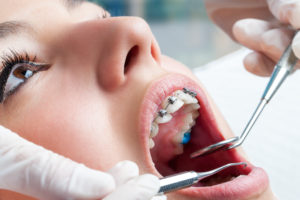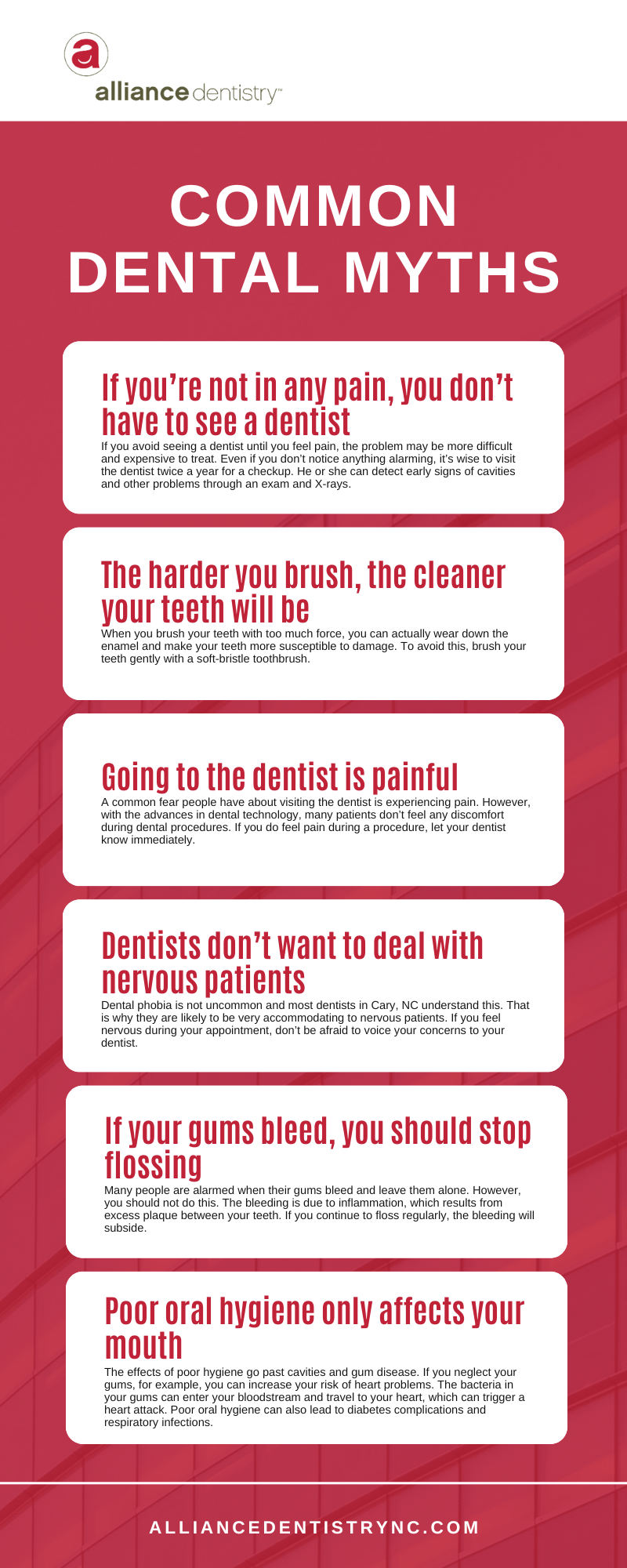Dentists Cary, NC

Dedicated Dentists You Can Trust
If you have been looking for Cary, NC dentists, then look no further. Our team of dentists provides compassionate, skilled, and dedicated service to all of our patients. With over 20 years of experience assisting patients in Cary, we have the experience to provide the care that you need and deserve. Schedule an appointment with Alliance Dentistry today. We offer cozy, plush leather chairs in our waiting area to make you as comfortable as possible.
Table of Contents
- Dedicated Dentists You Can Trust
- How Our Dentists Can Help You
- Common Dental Myths You Shouldn’t Believe
- Cary Dentist Infographics
- Cary Dentist FAQs
- Alliance Dentistry, Cary Dentists
- Contact Our Cary Dentists Today
Preparing For Your Dentist Visit if You are Scared
The dental chair has not been your friend. You dread going every year, and quite often, you find a convenient out to take the annual trip. While everything has been going along fine, it only takes one time for you to bite into a hard object to make your toes curl. Cracking a tooth is not only painful, but it can also end up in significant dental work if not addressed quickly. Don’t let your fear of dentists keep you from seeking preventative and emergency treatment.
Believe it or not, some Cary dentists have taken extra steps to ease the mind of those patients with a real fear of the chair. These dentists may have calming and pleasant office decor, meditative music, and even separate examination areas behind closed doors. These strategies were created to make even the most nervous patient feel at ease. When calling a dentist, ask what they do for patients who are afraid of the visit. They may invite you in to speak to the dentist in advance of the appointment. You may get a tour and find out some of the ways the office aims to keep you at ease.
Take a Reliable and Comforting Person
Some people in your life may have a natural calming effect on you, while others may hype you up. When taking a trip to the dentist, ask someone you trust to go with you. Choose someone who is a calming influence. Avoid anyone else who shares your fear of the dentist. Ask this person to stay with you during your treatment. Just having someone there with you to focus on may help keep you at ease. Another person can also listen to what the dentist has to say and help you process once you leave. An extra set of ears when you are nervous can be a positive addition.
Learn Relaxation Techniques
Some of the reactions you have when you are worried are physiological ones. It involves an increase in heart rate, which leads to rapid breathing, sweating, and lightheadedness. If you can learn to control these responses, you may be able to keep them at bay. Meditation and relaxation breathing may help you to calm yourself when you start feeling these physical effects of fear. The good news is that you can use these exercises in other areas of your life that may create stress. A visit to a dentist is necessary for maintaining your health. Therefore, learning to overcome your fear is essential.
How Our Dentists Can Help You
Alliance Dentistry brings unmatched experience across the dental care continuum in multiple settings: hospitals, research clinics, and private practices. As a patient, you need a dentistwho is knowledgeable, local, and caring. Our deep practice background offers insight, familiarity, and confidence to all patients. Contact us now to request an appointment with the dentist that is right for you and your family. This foundation shapes our collaborative approach to patient relationships as well as the diagnostic, preventive, restorative, and cosmetic treatments we offer.
What We Stand For
Simply put, Alliance reflects our shared core philosophy. As a husband and wife team, we are allies both at home in NC and in our approach to providing exceptional oral care to our Cary, NC patients. We build collaborative relationships with our patients, we’ve developed a network of first-rate specialists, and we’re committed to facilitating optimal dental health.
Timothy C. Raczka, D.D.S.

Maureen M. Raczka, D.D.S.
 Dr. Maureen M. Raczka earned her undergraduate degree from the University of Notre Dame and her dental degree from the State University of New York at Buffalo School of Dental Medicine. After completing a dental oncology residency at Roswell Park Cancer Institute in Buffalo, she spent two years practicing dentistry in private practice and at St. Luke’s Hospital in Cleveland, Ohio, where she also served as assistant director of the dental residency program. At the same time, she was a member of the teaching faculty at Case Western Reserve University. Returning to Buffalo, she was appointed clinical assistant professor in the Department of Restorative Dentistry at the State University of New York at Buffalo School of Dental Medicine and also practiced in private practice. After 11 years, Dr. Maureen and her family relocated to Cary, NC. She served as an associate professor in the Department of Prosthodontics at the University of North Carolina at Chapel Hill School of Dentistry for three years. She enjoys running and spending time with her three children. Email Dr. Maureen Raczka.
Dr. Maureen M. Raczka earned her undergraduate degree from the University of Notre Dame and her dental degree from the State University of New York at Buffalo School of Dental Medicine. After completing a dental oncology residency at Roswell Park Cancer Institute in Buffalo, she spent two years practicing dentistry in private practice and at St. Luke’s Hospital in Cleveland, Ohio, where she also served as assistant director of the dental residency program. At the same time, she was a member of the teaching faculty at Case Western Reserve University. Returning to Buffalo, she was appointed clinical assistant professor in the Department of Restorative Dentistry at the State University of New York at Buffalo School of Dental Medicine and also practiced in private practice. After 11 years, Dr. Maureen and her family relocated to Cary, NC. She served as an associate professor in the Department of Prosthodontics at the University of North Carolina at Chapel Hill School of Dentistry for three years. She enjoys running and spending time with her three children. Email Dr. Maureen Raczka.Common Dental Myths You Shouldn’t Believe
No matter how old you are, it is important to make your oral health a top priority. Proper oral hygiene practices can help you avoid dental diseases and improve your overall health. Here are a few common dental myths you shouldn’t believe:
- If you’re not in any pain, you don’t have to see a dentist.
Too many people wait until their tooth is sore to go to the dentist. If you avoid seeing a dentist until you feel pain, the problem may be more difficult and expensive to treat. Even if you don’t notice anything alarming, it’s wise to visit the dentist twice a year for a checkup. He or she can detect early signs of cavities and other problems through an exam and X-rays.
- The harder you brush, the cleaner your teeth will be.
This could not be farther from the truth. When you brush your teeth with too much force, you can wear down the enamel and make your teeth more susceptible to damage. To avoid this, brush your teeth gently with a soft-bristle toothbrush.
- Going to the dentist is painful.
A common fear people have about visiting the dentist is experiencing pain. However, with the advances in dental technology, many patients don’t feel any discomfort during dental procedures. If you do feel pain during a procedure, let your dentist know immediately.
- Dentists don’t want to deal with nervous patients.
Dental phobia is not uncommon and most dentists in Cary, NC understand this. That is why they are likely to be very accommodating to nervous patients. If you feel nervous during your appointment, don’t be afraid to voice your concerns to your dentist.
- If your gums bleed, you should stop flossing.
Many people are alarmed when their gums bleed and leave them alone. However, you should not do this. The bleeding is due to inflammation resulting from excess plaque between your teeth. If you continue to floss regularly, the bleeding will subside.
- Poor oral hygiene only affects your mouth.
The effects of poor hygiene go past cavities and gum disease. If you neglect your gums, for example, you can increase your risk of heart problems. The bacteria in your gums can enter your bloodstream and travel to your heart, which can trigger a heart attack. Poor oral hygiene can also lead to diabetes complications and respiratory infections.
Cary Dentist Infographic
Cary Dentist FAQs
How Can I Prevent Cavities
You can prevent cavities with the use of fluoride. Studied extensively for decades, fluoride exposure has been proven to prevent dental decay. Because of its role in protecting teeth, the Center for Disease Control and Prevention considers fluoridation of drinking water one of the ten greatest health achievements in the US in the 20th century.
How Does Fluoride Prevent Cavities?
Fluoride is a mineral found naturally in water, soil, rock, and many foods. When exposed to fluoride, teeth can become more resistant to cavities.
The outer layer of your teeth, enamel, is made primarily of the minerals calcium and phosphate, collectively called hydroxyapatite. All day, the enamel loses and gains minerals. Minerals are lost when acids -formed by plaque bacteria and carbohydrates -attack the enamel. This is called demineralization. When calcium, phosphate, and fluoride- from foods, water, and saliva-penetrate the enamel, remineralization occurs. But if there is more decalcification than remineralization, cavities start to form. When fluoride is present and part of the remineralization process, it forms a tough layer called fluorapatite. Fluorapatite is even stronger and better than hydroxyapatite in resisting decay. And fluoride can even reverse early decay.
Where Is Fluoride Available?
Most community water supplies in the United States contain fluoride. Adjustments are made to the level of fluoride in drinking water to obtain optimal amounts for the prevention of tooth decay. Grand Rapids, Michigan was the first city to begin adding fluoride to its water system, back in 1945. Since that time, community water fluoridation has been controversial. Years of rigorous scientific study, however, have shown water fluoridation at appropriate levels to be effective and safe. Currently, the U.S. Public Health Service recommends the fluoride-to-water ratio be 0.7 parts per million, an amount that takes into consideration exposure to other sources of fluoride.
Fluoride is found in certain foods, fluoridated toothpaste, and mouth rinses. In addition, your dentist Cary NC can apply fluoride to your teeth as a foam or varnish. These treatments contain much higher levels of fluoride found in toothpaste and mouth rinses. Varnishes are painted on teeth and foams are placed in trays which then sit on teeth for one to four minutes.
What Are the Benefits of Fluoride?
Both children and adults reap the cavity-fighting benefits of fluoride. Infants and children from six months to 16 years need appropriate levels of fluoride as primary and permanent teeth come in during these years. Topical fluorides – from toothpastes, mouth rinses, and fluoride treatments – are as important in fighting tooth decay as in strengthening developing teeth.
Conditions that may put adults at higher risk of tooth decay and would benefit from additional fluoride include dry mouth, gum disease, a history of frequent cavities, and having crowns or bridges. Dry mouth, caused by certain diseases, such as Sjogren’s Syndrome, certain medications, and radiation to the head and neck. Without saliva, teeth are more prone to cavities, because the acids formed during eating cannot be neutralized and remineralization is halted. Gum disease exposes more of the root surface to cavity-causing bacteria. Having crowns or bridges means that the risk of decay is higher at the crown/tooth interface.
Alliance Dentistry, Cary Dentists
Contact Our Cary Dentists Today
For over 20 years, families have been coming to Alliance Dentistry for all of their dental needs. Our entire staff at Alliance Dentistry will welcome you with a smile and make you feel part of our extended family. Our dentist is proud that our patient base includes several generations of the same families in the Cary, NC area, from the youngest members to grandparents—and that’s the best response we could hope to have. We love putting smiles on faces of all ages.
We want our patients to feel at ease from the moment they walk through the door. Alliance Dentistry maintains a safe and healthy environment so that our patients can trust that they are in good hands. We only use the most advanced, safe, and effective dental equipment. Alliance Dentistry understands this and you will not see outmoded or unsafe equipment at our clinic. As well, our staff and dentists undergo continuing education to stay abreast of groundbreaking equipment advances in oral healthcare.
When it comes to deciding who to turn to, many NC families would say “Alliance Dentistry”. We can say with confidence that our dentist has earned the trust of many in our community. Since 2007, Dr. Timothy C. Raczka and Dr. Maureen M. Raczka have provided a wide range of dental services to patients of every age.
Our dentists offer a wide range of dental services. We are also committed to infection control by utilizing infection control practices. If you would like to learn why many consider our dentists to be the best in Cary, NC, schedule an appointment for a comprehensive dental exam, dental crown, tooth filling, teeth whitening, braces appointment, and more. Give us a call at Alliance Dentistry if you’re looking for trusted dentists in Cary, NC.

